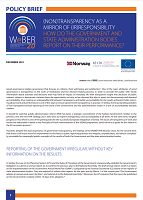(Non)transparency as a mirror of (ir)responsibility: How do the government and state administration bodies report on their performance?
(Non)transparency as a mirror of (ir)responsibility: How do the government and state administration bodies report on their performance?
Author(s): Milica Škorić
Subject(s): Governance, Public Administration, Government/Political systems, Corruption - Transparency - Anti-Corruption
Published by: Centar za evropske politike CEP
Keywords: Transparency; Accountability; Government reporting; State administration; Performance evaluation; Public sector; Responsibility; Governance;
Summary/Abstract: Good governance implies governance that focuses on citizens, their well-being and satisfaction. One of the main attributes of good governance is transparency in the work of institutions and the decision-making process, in order to provide the public with timely information about activities and decisions that may have an impact on everyday life. With transparent insight into decisions of public interest, citizens in democratic societies have the opportunity not only to be informed but also to point out shortcomings and demand accountability, thus creating an unbreakable link between transparency and public accountability for the results achieved. Public reporting about work and performance is one of the ways to ensure government transparency in practice. In Serbia, the long-standing problem of non-transparent annual reporting on the work of the Government and the administration results in a lack of accountability towards citizens.
Series: Centar za evropske politike - POLICY BRIEF
- Page Count: 4
- Publication Year: 2021
- Language: English
- Content File-PDF

